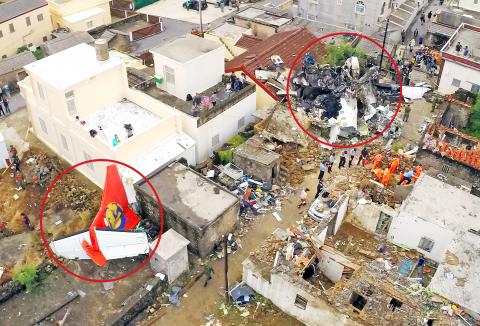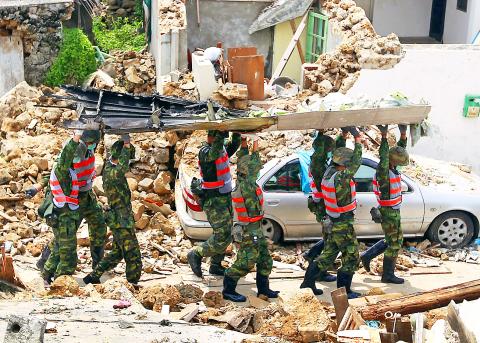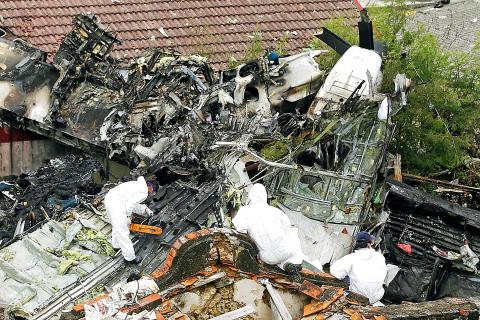The crash of TransAsia Airways (復興航空) Flight GE222 outside Magong Airport on Penghu Wednesday evening killed 48 people aboard the plane and injured 10, officials said yesterday.
Civil Aeronautics Administration (CAA) Director-General Jean Shen (沈啟) said that rescuers had located 48 bodies at the crash site in Sisi Village (西溪), but many of the bodies were not intact.
As of press time last night, CAA Deputy Director-General Lee Wan-lee (李萬里) said the rescuers have yet to confirm the identities of 17 bodies, including that of the pilot, Lee Yi-liang (李義良).

Photo: Lo Pei-der, Taipei Times
Amid questions as to why the flight was allowed to depart from Greater Kaohsiung amid inclement weather conditions, and if such a flight had violated regulations, Lee said the weather information at 7pm on Wednesday showed that the wind was blowing southwest, while the flight path was on a north-south route.
Visibility was 1.6km, with the wind blowing at a speed of 20kph and cloud ceiling of 330 feet (100.5m), Lee said.
Data also showed that winds gust were blowing at 38kph and there was a thundershower of medium intensity in the air as well, he said.

Photo: Pichi Chuang, Reuters
Based on the flight standard set for civilian aircraft, ATR72 aircraft are able to take off and land in such weather, he said.
However, an aircraft’s pilot has the right to decide if they want to land in any given situation, Lee said.
“Even if the weather was fine, the captain could still choose not to land the aircraft if he felt there was something strange with the wind and decided to go around instead,” Lee said. “CAA record shows that a Uni Air (立榮航空) flight had landed at the Magong Airport before the TransAsia crash.”

Photo: Pichi Chuang, Reuters
Lee said he would not speculate if the pilot had experienced deteriorated visibility within a very short period of time, adding that Aviation Safety Council (ASC) investigators would be able to determine the cause of the crash after decoding the information recorded in the flight data recorder and cockpit voice recorder.
CAA data showed that Flight GE222 was circling above Penghu for about 30 minutes before it prepared to land following improved visibility.
Air traffic control personnel said they received a request from the pilot to go around at 7:06pm, but they lost track of the aircraft afterward.
The visibility worsened from 1.6km to 0.8km at 7:10pm.
What happened to the pilot within the four-minute interval is considered key to the investigation.
Both of the plane’s “black boxes” were brought back to Taiwan proper yesterday afternoon.
ASC investigators said that the exterior of the cockpit voice recorder was slightly damaged, but they said that the memory of the device should still be intact. The flight data recorder looked relatively undamaged.
ASC Executive Director Thomas Wang (王興中) said the council is would issue a preliminary result of the plane crash investigation within four weeks, adding that a more detailed report could be produced within three to four months.
Casualties caused by the accident ended the best aviation safety record achievement in the past two decades.
Statistics from the CAA showed last month that the average aviation accident rate was 0.17 times per million flight hours, which was better than the global average of 0.32 times per million flight hours.
TransAsia said that each passenger’s family would receive a preliminary compensation of NT$1 million (US$ 33,360). Civil aviation regulations stipulate compensation for each deceased passenger is NT$3 million, and NT$1.5 million for passengers who suffer major injuries.
Lee said these figures do not include any settlements that might be reached in civil court cases.

NATIONAL SECURITY THREAT: An official said that Guan Guan’s comments had gone beyond the threshold of free speech, as she advocated for the destruction of the ROC China-born media influencer Guan Guan’s (關關) residency permit has been revoked for repeatedly posting pro-China content that threatens national security, the National Immigration Agency said yesterday. Guan Guan has said many controversial things in her videos posted to Douyin (抖音), including “the red flag will soon be painted all over Taiwan” and “Taiwan is an inseparable part of China,” while expressing hope for expedited “reunification.” The agency received multiple reports alleging that Guan Guan had advocated for armed reunification last year. After investigating, the agency last month issued a notice requiring her to appear and account for her actions. Guan Guan appeared as required,

Japan and the Philippines yesterday signed a defense pact that would allow the tax-free provision of ammunition, fuel, food and other necessities when their forces stage joint training to boost deterrence against China’s growing aggression in the region and to bolster their preparation for natural disasters. Japan has faced increasing political, trade and security tensions with China, which was angered by Japanese Prime Minister Sanae Takaichi’s remark that a Chinese attack on Taiwan would be a survival-threatening situation for Japan, triggering a military response. Japan and the Philippines have also had separate territorial conflicts with Beijing in the East and South China

A strong cold air mass is expected to arrive tonight, bringing a change in weather and a drop in temperature, the Central Weather Administration (CWA) said. The coldest time would be early on Thursday morning, with temperatures in some areas dipping as low as 8°C, it said. Daytime highs yesterday were 22°C to 24°C in northern and eastern Taiwan, and about 25°C to 28°C in the central and southern regions, it said. However, nighttime lows would dip to about 15°C to 16°C in central and northern Taiwan as well as the northeast, and 17°C to 19°C elsewhere, it said. Tropical Storm Nokaen, currently

PAPERS, PLEASE: The gang exploited the high value of the passports, selling them at inflated prices to Chinese buyers, who would treat them as ‘invisibility cloaks’ The Yilan District Court has handed four members of a syndicate prison terms ranging from one year and two months to two years and two months for their involvement in a scheme to purchase Taiwanese passports and resell them abroad at a massive markup. A Chinese human smuggling syndicate purchased Taiwanese passports through local criminal networks, exploiting the passports’ visa-free travel privileges to turn a profit of more than 20 times the original price, the court said. Such criminal organizations enable people to impersonate Taiwanese when entering and exiting Taiwan and other countries, undermining social order and the credibility of the nation’s